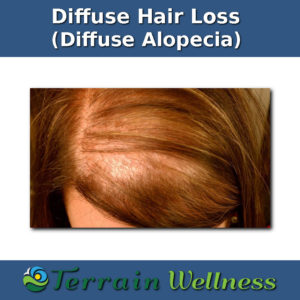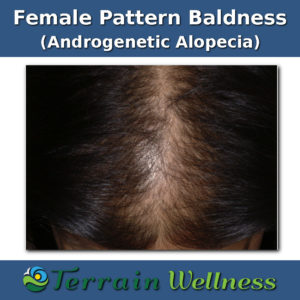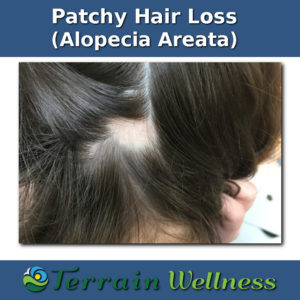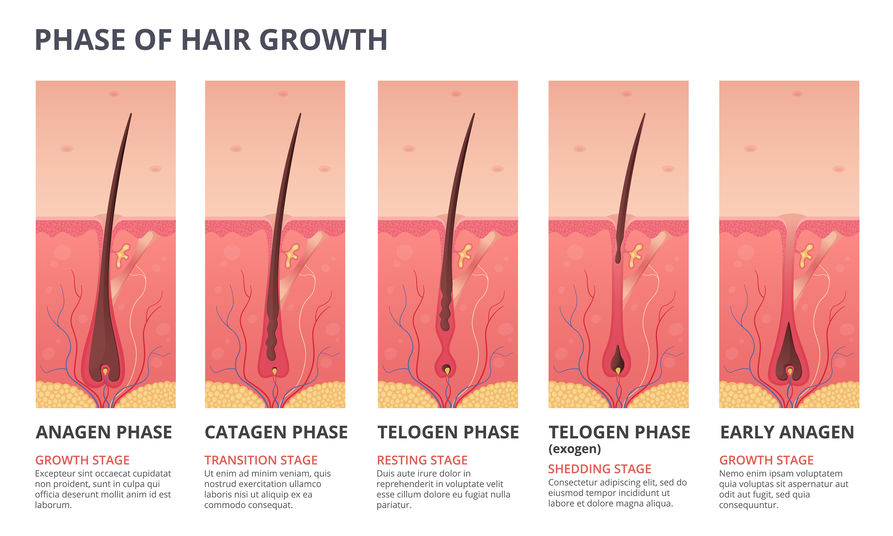Thyroid Hair Loss
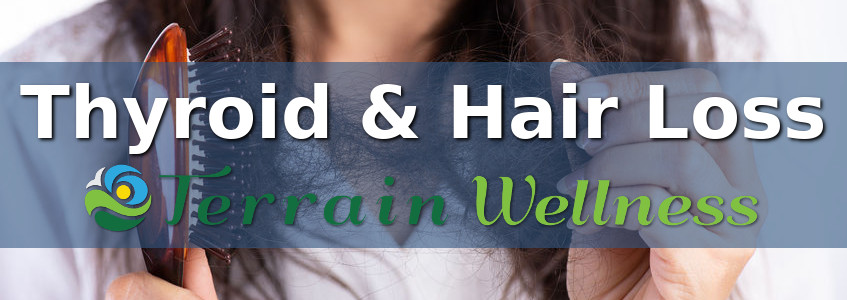
- Nutrient Deficiency
- Nutrient Absorption
- Types of Hair Loss
- The Biology of Hair Loss
- Reduce Inflammation
Table of Contents:
For many patients, the point in time when they firmly resolve to get serious about their thyroid condition is when they begin to notice significant hair loss. Although there are many brave people successfully challenging this norm, a full head of hair is still part of many people’s identity. While the thought of losing one’s hair might be distressing, the great news is that it is usually reversible when we properly treat the underlying conditions and contributing factors.
Whenever we enter into a discussion of thyroid and hair loss, it is important to point out that there are many other health conditions and factors that can contribute to hair loss. Other causes of hair loss include genetic factors and the aging process. In many situations, there are multiple causal factors for hair loss. For example, life events such as menopause and child birth often result in a hormonal pattern of estrogen imbalance that can cause thyroid issues with their usual host of symptoms. Problems with the thyroid are often brought on by complex hormonal patterns, gut-health/microbiome, nutritional deficiency, environmental toxins, autoimmune conditions and lifestyle. For this reason, me prescribing a quick-fix of Synthroid would not solve the underlying health conditions that caused thyroid hair loss in the first place.
With the disclaimers and introductions out of the way, let’s learn more about the underlying causes related to problems of thinning locks and hormonal imbalance.
Reversing Thyroid and Hair Loss Symptoms Naturally:
- Iron
-

Iron is especially important for women because menstruation and pregnancy tax the body’s iron reserves. What’s even more interesting about iron in the body, is that iron is crucial for thyroid health and healthy hair. In cases of hair loss and hypothyroid symptoms, anemia (iron deficiency) is one of the primary suspects. In severe cases of anemia, I will at times prescribe IV therapy to rebuild healthy iron levels in the body using products such as Venofer. Getting lab tests is important with iron supplementation, as too much iron can be harmful. - Magnesium
-

Magnesium helps manage proper hair growth cycles and also plays a role in supporting our muscles, nervous system, blood sugar and blood pressure. Put simply, magnesium is a critical nutrient for supporting human life. Say thanks to magnesium if you appreciate things like muscles, the brain, cardiovascular system and maintaining one’s luxurious flowing locks. While some patients may need to take a magnesium supplement, the most natural way to get more of this mineral is to consume it in foods like spinach, nuts (almonds and cashews), avocado and dark chocolate. - Zinc
-

Zinc is another important mineral for healthy hair, with many linking proper zinc intake with healthy hair that has enough natural oils to resist damage and breakage. But that’s not all, zinc is important for supporting vital functions within the body like creating DNA, supporting the immune system and cell reproduction. A few natural sources for zinc are red meat and shellfish, but you can also get some zinc from eating legumes and seeds. - Biotin (Vitamin B-7)
-

Biotin is crucial for healthy hair nails and skin and is also needed for properly metabolizing the foods we eat. Also of note, vitamin B-7 may support healthy blood-sugar regulation and adrenal function. Long-term stress depletes the adrenals and causes thyroid dysfunction while depleting the body’s biotin levels. Given Biotin’s role in hair and hormone production, it makes sense that problems with thyroid and hair loss often coincide. NOTE: taking Biotin as a supplement can lead to false readings on thyroid panels, so it might be a good idea to skip taking it for a week prior to getting labs done. You can incorporate foods like egg yolks, nuts, cauliflower, bananas and mushrooms into your meal plan to up your Biotin naturally.
- Collagen
-

Collagen is the most abundant protein in the human body. Collagen fibers provide strength to joints, tendons, ligaments, skin and bones throughout the body. If that weren’t enough, collagen is also a main component of our hair. Collagen has long been a popular ingredient in many health and beauty products for years, which makes sense given that collagen gives skin its elasticity and makes hair strong. While the body produces its own natural collagen, we need to feed ourselves plenty of the natural building-blocks to support production. The easiest way to get more collagen is to eat foods that are high in collagen like bone broths and gelatin. Incorporating foods like beef, chicken, fish, eggs, broccoli and greens into one’s meal plan helps support the body’s collagen production. Long-time vegetarians and vegans will need to pay special attention to make sure they get enough protein.
Nutrients & Hair:
Thyroid and hair loss are closely related for a number of reasons, one of which is that follicles compete with critical functions within the body that are necessary for life. Because our human biology prioritizes survival above all else, the body will sacrifice our beautiful strands during times of stress and scarcity. A complete meal plan that provides ample nutrition is important for maintaining hormone balance and a full head of flowing locks. While this list is by no means exhaustive, here’s a few vitamins and minerals that the body needs to support healthy hormone levels and fuller tresses.
Thyroid and Hair Loss: Nutrient Absorption
While getting proper nutrients into the body goes a long way in restoring one’s tresses back to their full glory, there’s often more complex hormonal imbalances and health conditions that led to the deficiency to begin with. Although our food choices influence our health, there are other factors that greatly affect how food is digested and nutrients absorbed.
There’s a lot more to healthy hormones and hair than simply taking some vitamins. As we’ll soon learn, factors such as our stomach acid, the quality and relative quantities of the natural bacteria living in our digestive system and systemic inflammation in the body all have a tremendous influence on how we absorb nutrients from the food we eat. For this reason, it is common for me to see patients who are deficient in certain vitamins and minerals despite eating plenty of nourishing foods.
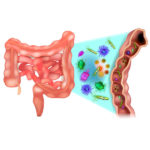
The importance of having healthy probiotics in the digestive system has become mainstream knowledge in recent years. However, many doctors are just beginning to appreciate that gut flora can have a tremendous influence on thyroid health and hair quality. As described more fully in my article on blood sugar and gut microbiome listed below, each type of probiotic is specialized to help digest a certain type of food. It may sound strange, but these probiotics are actually living bacteria that help us digest food. Eating too many refined sugars and carbohydrates causes an overgrowth of bacteria that are tied to inflammation and autoimmune conditions that interfere with proper nutrient absorption.
Adding another layer, research shows that gut microbiome is also correlated with important female hormones like Estrogen. Interestingly, hormonal imbalances like Estrogen Dominance cause thyroid problems, and thyroid problems are tied to hair loss.

For many suffering from acid reflux, the obvious answer is to take antacids. However, beyond its commonly known role in digesting food, stomach acid is necessary for absorbing the nutrients like iron, which is required for healthy thyroid and hair. As such, while antacids usually bring temporary relief to symptoms, the problem is that lower stomach acid reduces iron absorption. Many turn to antacids due to long-term stress or adrenal fatigue, because stress depletes the stomach of compounds like prostaglandins that protect it from acid. But, this compounds the problem in that adrenal fatigue and low stomach acid are both tied to thyroid disruption.
But, it gets worse. Low stomach acid also increases the risk of developing a harmful condition called “SIBO” (Small Intestine Bacterial Overgrowth). In a healthy digestive system, stomach acid being dumped into the small intestine along with partially digested food helps to kill off excess bacteria in the gut. Without adequate stomach acid, these bacteria can easily overcrowd the small intestines and create a number of unwelcome health consequences like hypothyroidism and the hair loss that comes with it (SIBO & Hypothyroidism). Low stomach acid, the use of antacid medications and taking antibiotics are a few of the common contributing factors to SIBO. In regard to hair loss, SIBO is one of many contributing factors to an inflammatory condition called “leaky gut” that reduces nutrient absorption from food, leaving patients malnourished no matter what they eat.

Getting inflammation and oxidative stress under control is crucial for hormone balance, slowing the aging process and improving hair quality. Medical research shows that there is a reciprocal relationship between hyperthyroidism and hypothyroidism and oxidative stress and inflammation. You may have heard of the benefits of “antioxidants” and the dangers of “free radicals”; oxidative stress is the process through which free radicals harm the body. Also see: Liver detoxification and oxidative stress. Prolonged emotional stress, SIBO and other unhealthy gut probiotic patterns, foods that provoke inflammation or allergic response and even undiagnosed viral infections can all contribute to inflammation in the body.
Because inflammation causes thyroid dysfunction and thyroid dysfunction causes inflammation, I have seen many patients get stuck in a harmful positive feedback loop of inflammation and increased hormonal imbalance. Serious cases may require medical intervention, you might try these at-home steps first. Lifestyle changes like modifying one’s meal plan, incorporating more physical movement and finding positive outlets for stress like meditation, yoga, therapy for relationships and mindfulness can all help reduce inflammation.
-
Anti-inflammatory foods:
- fish
- nuts
- olive oil
- spinach
- kale
- broccoli
- strawberries
- blueberries
- cherries
- orange
-
Inflammatory Foods
- french fries
- chips
- sugar/soda
- corn syrup
- processed foods
- refined carbohydrates
- Grains, gluten
- Zero Calorie Sugar Substitutes
- candy
- sweetened yogurt
- desserts
Types of Hair Loss:
While there are multiple types of baldness associated with both hypothyroidism and hyperthyroidism, the most common manifestation of hair loss related to thyroid is known as diffuse hair loss, which represents about 71% of cases according to the research. The defining characteristic of diffuse hair loss is that the effected area is evenly distributed or “diffuse”, rather than being concentrated in specific areas like “male pattern baldness”. Other manifestations losing one’s hair due to thyroid include androgenetic alopecia (male pattern baldness, female pattern baldness) at 14% of cases and alopecia areata (patchy hair loss often associated with autoimmune thyroid conditions).
The Biology of Thinning Hair
The traditional wisdom to explain the biology behind diffuse thinning is a medical condition known as Telogen Effluvium. Follicles go through alternate growth and rest phases, Telogen Effluvium is a process where the growth phase is interrupted and the rest phase is extended. During the rest phase of the follicle, individual strands of hair naturally fall out and are replaced by other follicles moving back into a new growth phase. Under this understanding of thinning hair and hormone balance, diffuse thinning occurs when more follicles are entering into (or remaining in) their natural rest phases than are going back into growth phases, resulting in a net decrease in the strand count.
However, a growing body of medical research suggests that thyroid and hair loss are more closely linked by weakened hair strands becoming brittle, breaking and then falling out. It’s also very likely that both prolonged follicle rest phases and weakened hair breaking/falling-out could both be at work when it comes to our distressingly thinning tresses. All this begs the question: what do prolonged follicle rest, brittle, weakened hair and thyroid symptoms have in common?
- Thiamine (Vitamin B-1)
- Selenium
- magnesium
- Zinc
- Protein
- Vitamin D*
- B-12*
- iron (measured as ferritin)*
Hypothyroidism Hair Loss (Nutrient Deficiency):
*Note that the nutrients labelled with an asterisk can be harmful if too much is taken, so patients should get labs done prior to supplementation with those nutrients.
Source: Isabella Wentz, “Thyroid Pharmacist”
Interestingly, health conditions like Hashimoto’s usually coincide with certain nutrient deficiencies like B vitamins, magnesium, vitamin D, zinc and iron. It’s also worth noting that many of those same nutrients are required to grow healthy hair. Most people know that the foods we eat have a tremendous impact on our overall health. Not only does our nutrition plan determine whether our bodies get the nutrients we need, but it is also responsible for the quality of our Insulin Response and blood sugar levels. High carbohydrate foods, sugary foods and even zero-calorie sugar-substitutes all create an insulin response that our body has to recover from. Aside from insulin resistance, diabetes, heart disease and premature death, why should we be concerned about blood sugar when it comes to thyroid health?
What some may not know, is that the foods we eat, medications and lifestyle influence the balance of probiotics that live in our gut in either positive or negative ways, depending on our food choices, medications and lifestyle. At Terrain Wellness, we are accepting new patients and as you can probably already tell, we have deep experience in treating hormonal imbalances of all types. Whether or not you come see us, I hope you found this article helpful and I wish you all the best on your journey to your best health and wellness.
Yours in health,
Dr. Danielle Lockwood


